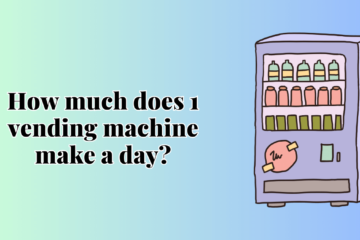In this article, we delve into the question, “Is buying vending machines a good investment?” Vending machines have become a ubiquitous part of our daily lives, offering convenience and quick access to snacks, beverages, and various other products. For entrepreneurs and investors looking for business opportunities, vending machines can be an attractive option due to their low operating costs and potential for passive income.
Whether you’re considering starting a vending machine business or adding machines to your existing portfolio, it’s essential to explore the ins and outs of this venture. In the sections below, we’ll explore various aspects of investing in vending machines, including the benefits, challenges, and key factors to consider. Let’s dive in!
Is Buying Vending Machines a Good Investment?
When evaluating any investment opportunity, it’s crucial to weigh the pros and cons carefully. Here, we’ll explore the reasons why vending machines can be a promising investment and the factors that may affect their profitability.
1. Low Overhead Costs and Passive Income Potential
Vending machines require minimal overhead costs compared to traditional businesses. Once installed, they operate with little human intervention, reducing the need for a large workforce. This means lower labor expenses and the potential for passive income generation, as the machines work round the clock without constant supervision.
2. Recurring Revenue Stream
One of the primary advantages of investing in vending machines is the recurring revenue stream. As long as your machines are strategically placed in high-traffic areas and stocked with popular products, you can expect a steady flow of income. People’s need for quick and convenient purchases ensures a constant demand for vending machine services.
3. Diversification of Income Sources
Adding vending machines to your investment portfolio can provide diversification, which is essential for risk management. While other investments may be subject to market fluctuations, the demand for vending machine products tends to remain relatively stable, making it a reliable income source.
4. Flexibility in Product Selection
Vending machines offer the flexibility to choose from a wide range of products, catering to diverse customer preferences. You can focus on snacks, beverages, healthy options, or even niche products, depending on the target location and audience.
5. Understanding the Location Factor
The success of a vending machine business greatly depends on its location. Strategic placement in high-traffic areas such as shopping malls, office complexes, airports, and schools can significantly impact the profitability of the investment. Researching and identifying suitable locations is crucial for a successful venture.
6. Operational Efficiency and Maintenance
Maintaining operational efficiency is vital for a profitable vending machine business. Regularly restocking products, ensuring proper functionality, and promptly addressing technical issues are essential tasks for maximizing revenue and customer satisfaction.
7. Marketing and Branding
Effectively marketing your vending machines and products can help attract more customers and increase sales. Eye-catching branding, promotions, and loyalty programs can create a positive customer experience, leading to repeat business and word-of-mouth referrals.
8. Technology Integration
Modern vending machines can be equipped with cutting-edge technology, such as cashless payment systems and real-time data tracking. Embracing such advancements can enhance customer convenience and provide valuable insights for business optimization.
Key Considerations and Challenges
While investing in vending machines offers exciting prospects, it’s essential to be aware of potential challenges and key considerations. Here are some aspects to keep in mind before venturing into this business:
1. Initial Capital Investment
While vending machines generally have low operating costs, the initial capital investment can be significant, especially if you plan to purchase multiple machines. Conduct a thorough cost analysis to understand the financial commitment required.
2. Competitive Market Landscape
Depending on your chosen location, you may face competition from existing vending machine businesses. Research your competitors, identify gaps in the market, and devise a unique selling proposition to stand out.
3. Product Selection and Demand
Choosing the right products is critical for attracting customers. Conduct market research to understand the preferences and demands of your target audience, and adapt your product selection accordingly.
4. Machine Security and Maintenance
Vending machines are susceptible to vandalism and technical issues. Investing in robust security measures and establishing a maintenance routine can safeguard your machines and ensure uninterrupted service.
5. Health and Safety Regulations
Complying with health and safety regulations is essential for operating vending machines. Ensure that your products meet all relevant standards and that your machines are regularly inspected for hygiene and safety.
6. Sustainability and Environmental Impact
As environmental consciousness grows, consumers appreciate businesses that prioritize sustainability. Consider eco-friendly practices in your vending machine operations, such as using energy-efficient machines and offering biodegradable packaging.
FAQs
- Is buying vending machines a good investment for passive income?
- Yes, vending machines can be an excellent source of passive income due to their low operating costs and ability to generate revenue without constant supervision.
- Yes, vending machines can be an excellent source of passive income due to their low operating costs and ability to generate revenue without constant supervision.
- How much can I earn from a vending machine business?
- Earnings from vending machines can vary depending on location, product selection, and foot traffic. On average, a well-placed and stocked machine can generate several hundred to a few thousand dollars in monthly income.
- Earnings from vending machines can vary depending on location, product selection, and foot traffic. On average, a well-placed and stocked machine can generate several hundred to a few thousand dollars in monthly income.
- Are there any tax benefits to investing in vending machines?
- Yes, in some regions, investing in vending machines may qualify for certain tax deductions and benefits. Consult a tax professional to understand the specific advantages available in your area.
- Yes, in some regions, investing in vending machines may qualify for certain tax deductions and benefits. Consult a tax professional to understand the specific advantages available in your area.
- What are the most profitable products to sell in vending machines?
- The profitability of products can vary based on location and consumer preferences. Generally, popular snacks, cold beverages, and healthy food options tend to perform well.
- The profitability of products can vary based on location and consumer preferences. Generally, popular snacks, cold beverages, and healthy food options tend to perform well.
- How do I find the best locations for my vending machines?
- Conduct market research and seek out high-traffic areas, such as malls, offices, universities, and transportation hubs. Establishing partnerships with local businesses can also help secure prime locations.
- Conduct market research and seek out high-traffic areas, such as malls, offices, universities, and transportation hubs. Establishing partnerships with local businesses can also help secure prime locations.
- What maintenance tasks are essential for vending machines?
- Regularly restocking products, ensuring proper machine functionality, and maintaining cleanliness are essential maintenance tasks. Additionally, promptly addressing any technical issues is crucial for uninterrupted service.
- Regularly restocking products, ensuring proper machine functionality, and maintaining cleanliness are essential maintenance tasks. Additionally, promptly addressing any technical issues is crucial for uninterrupted service.
Conclusion: A Viable Venture with Considerations
Investing in vending machines can indeed be a good investment, offering the potential for passive income and diversification of revenue streams. With low overhead costs and the ability to tailor product selection, this business can be both rewarding and profitable.
However, it’s essential to carefully assess the initial capital required, research the market landscape, and choose strategic locations to maximize success. By prioritizing maintenance, adhering to regulations, and embracing technology, investors can establish a thriving vending machine business.
Remember, like any investment, success comes with dedication, innovation, and understanding the needs of your target audience. By continuously adapting to market trends and customer preferences, you can make buying vending machines a rewarding and sustainable venture.




